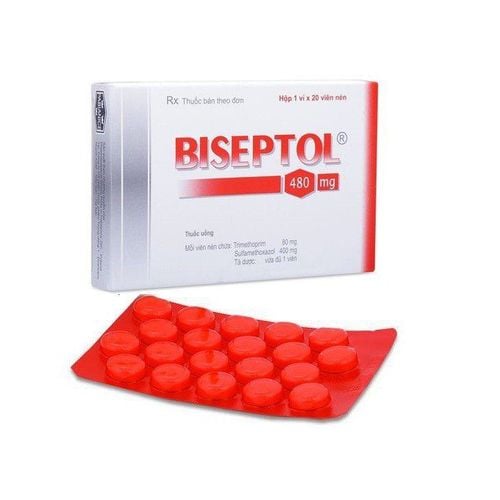This is an automatically translated article.
Bismuth has the ability to slow down the growth of bacteria that cause diarrhea. Therefore, it is used in the treatment of stomach disorders, nausea, diarrhea, ... in patients.
1. What is Bismuth?
Bismuth is a drug used to treat stomach disorders, heartburn, nausea, and diarrhea in patients. Bismuth works by slowing the growth of bacteria that can cause diarrhea.
2. How to use Bismuth
Bismuth is taken by mouth as directed by the manufacturer or prescribed by a doctor. Dosage is based on the patient's age, medical condition, and response to treatment.
Note when taking medicine:
Double check the ingredients on the drug label even if you have used the product before to avoid using the wrong product; Do not increase the dose or take the medicine too often compared to the instructions for use; Do not take more medication than is recommended for your age; If using chewable tablets, chew each pill thoroughly and then swallow. If using liquid medication, shake the bottle well before using. It is necessary to measure the dose used by a specialized measuring instrument; Use the medicine exactly as prescribed by your doctor to get the most benefit. To remember, you should take your medicine at the same time of day; The product should not be used to self-treat diarrhea if the patient has a fever or blood/mucus in the stool. As this can be a sign of a serious medical condition, the patient should notify the doctor for specific treatment instructions; Do not use Bismuth to self-treat a stomach ulcer. It should be used in combination with other medicines prescribed by your doctor because it can cause serious bleeding problems when used alone in patients with stomach ulcers; Tell your doctor if your condition does not improve or continues to get worse after taking the medicine. If you are taking medication to treat diarrhea, tell your doctor if it persists for more than 2 days.

Thuốc Bismuth được sử dụng bằng đường uống
3. Side effects of Bismuth
Side effects of Bismuth are very rare, but patients can still experience some of the following side effects:
Darkening of stools or tongue: These side effects are quite common, harmless, will disappears when you stop taking the medicine; Vomiting, diarrhea continuously causing severe dehydration of the body: Symptoms of dehydration include: Abnormal decrease in urination, dry mouth, unusual thirst, rapid heart rate, dizziness, lightheadedness; Tinnitus , hearing loss; Stomach or intestinal bleeding: Symptoms include: Vomiting like coffee grounds, black, bloody stools, abdominal pain or persistent abdominal pain. This is a rare side effect that needs to be treated promptly. Serious allergic reactions: Rash, itching, swelling (especially of the face, tongue, throat), severe dizziness, trouble breathing,... These are very rare side effects that need to be informed. doctor immediately to take measures to treat and prevent dangerous complications.
4. Precautions for Bismuth side effects
Before taking Bismuth, the patient should tell the doctor if he is allergic to the drug's ingredients; Before use, the patient should consult a doctor if there are bleeding problems such as hemophilia, black or tarry stools; Medicines that may contain aspartame: If you have phenylketonuria or any other medical condition that requires you to limit your intake of aspartame (or phenylalanine), you should consult your doctor for safe use; Before taking the drug, the patient should inform the doctor about all the drugs he is taking; Children and adolescents should not take Bismuth if they have the flu, chickenpox, undiagnosed illnesses, or have recently been vaccinated. In this case, the use of the drug may increase the risk of Reye's syndrome; During the first 6 months of pregnancy, the drug should be used only when absolutely necessary. Bismuth is also not recommended for use in the last 3 months of pregnancy because it can harm the fetus and affect reproduction; Consult your doctor before taking this medicine if you are breast-feeding.

Thuốc Bismuth cần được sử dụng theo chỉ định của bác sĩ
5. Drug interactions
Bismuth can interact with other drugs such as tetracycline, chloroquine... to prevent the body from absorbing the drug completely. Therefore, the patient needs to talk to the doctor about taking medicine to prevent this risk; Bismuth can increase the risk of bleeding when used with other drugs such as: Clopidogrel, dabigatran, enoxaparin, warfarin, .... Therefore, it should be used with caution. Taking Bismuth with other pain relievers and fever reducers such as aspirin, ibuprofen or naproxen may increase the risk of side effects; Bismuth may interfere with certain X-ray tests (contrast X-ray of the intestines) and may cause erroneous test results. Therefore, before taking Bismuth, patients need to talk to their doctor about all the medicines they are taking.
6. Handling overdosage, missed dose and how to store
Overdose: If the patient overdoses and has serious symptoms such as fainting, difficulty breathing, the family should call an ambulance immediately; Missed 1 dose: If you miss a dose, take it as soon as you remember. If it is almost time for the next dose, skip the missed dose and take the next dose on time. Do not take a double dose; Store the drug at room temperature 20 - 25°C, protected from light and high humidity; Dispose of the product properly when it expires or when it is not needed. Patients need to use Bismuth exactly as prescribed by the doctor to effectively treat diseases such as nausea, heartburn, diarrhea, ... At the same time, when there are abnormal manifestations, they are suspected to be side effects of the drug. medication, the patient should immediately notify the doctor for timely treatment.
Reference source: webmd.com













